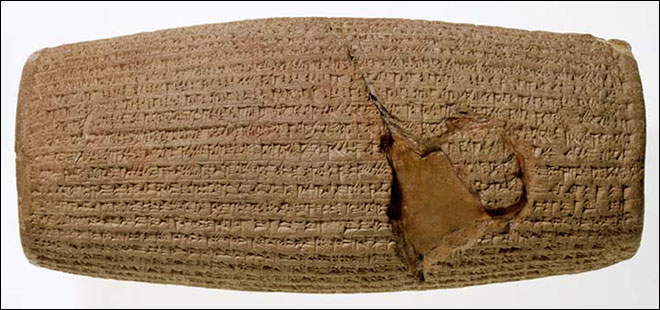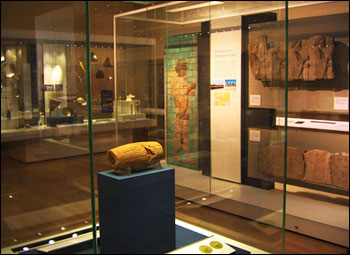 | Transliteration
(Rogers 1912: 380-84) | Translation
(Adapted from Rogers 1912: 380-84) |
| 1 | [. . . . . . . . . . . . . . . . . . . . . . . . . .]-ni-Šu | [. . . . . . . . . . . . . . . . . . . . . . .] his troops |
| 2 | [. . . . . . . . . . . . . . . . . . . . . . . .]-ki-ib-ra-tim | [. . . . . . . . . . . . four] quarters of the world |
| 3 | [. . .]-ka gal ma tu-û i Š -Šak-na a-na e-nu-tu ma-ti- Šu | [. . .] a weakling was established as ruler over his land |
| 4 | Ši-[. . . . . . . . . . ta-am]-Ši-li ú- Ša-aŠ-ki-na si-ru-Š u-un | and [. . . . .] a similar one he appointed over them, |
| 5 | ta-am-Ši-li É-sag-ila i-te-[. . . . . . -ti]m a-na Uriki ù si-it-ta-tim ma-ha-za | like Esagila he made [. . .] to Ur and the rest of the cities, |
| 6 | pa-ra-as la si-ma-a-ti- Šu-nu ta-[. . . . . l]i û-mi- Šá-am-ma id-di-ni-ib-bu-ub ù ana na-ak-ri-tim | a command dishonouring them [. . . . .] he planned daily and in enmity, |
| 7 | sat-tuk-ku ù-Šab-ti-li ú-ad-[di . . . . . . iŠ] -tak-ka-an ki-rib ma-ha-zi pa-la-ha iluMarduk Šar ilâni [Šá]-qi- Še a-Šu-uŠ- Šu | he caused the daily offering to cease; he appointed [. . .] he established within the city. The worship of Marduk, king of the gods [ . . . ] |
| 8 | li-mu-ut-ti ali-Šu [i-te]-ni-ip-pu-uŠ û-mi- Šá-am-ma na-[. . . . niŠe ] i-na ab-Ša-a-ni la ta-ap-Š ú-úh -tim ú-hal-li-iq kul-lat-si-in | he showed hostility toward his city daily
[. . .] his people; he brought all of them to ruin through servitude without rest. |
| 9 | a-na ta-zi-im-ti-Ši-na iluEllil lililani iz-zi-iŠ i-gu-ug-ma[. . .] ki-su-úr-Šú-un ilâni a- Ši-ib lib-bi-Š ú-nu i-zi-bu ad-ma-an- Šú-un | On account of their complaints, the lords of the gods became furiously angry and left their land; the gods, who dwelt among them, left their homes, |
| 10 | i-na ug-ga-ti Šá ú- Še-ri-bi a-na ki-rib Babili ilu Marduk ti-[. . . .] li-sa-ah-ra a-na nap-har da-ád-mi Šá in-na-du-ú Šú-bat-su-un | in anger over his bringing into Babylon. Marduk [. . .] to all the dwelling places, which had become ruins, |
| 11 | ù niŠe mât Šú-me-ri ù Ak-ka-dikiŠ a i-mu-ú Ša-lam-ta-aŠ ú-sa-ah-hi-ir ka- [. . . .]- Ši ir-ta-Š i ta-a-a-ra kul-lat ma-ta-a-ta ka-li- Ši-na i-h i-it ib-ri-e-Šu | and the people of Sumer and Akkad, who were like corpses [. . . .] he turned and granted mercy. In all lands everywhere |
| 12 | iŠ-te-'-e-ma ma-al-ki i- Ša-ru bi-bil lib-bi Šá it-ta-ma-ah qa-tu-uŠ-Šú m Ku-ra-aŠŠar ali An- Šá-an it-ta-bi ni-bi-it-su a-na ma-li-ku-tim kul-la-ta nap- h ar iz-zak-ra Šú-[ma- Š u] | he searched; he looked through them and sought a righteous prince after his own heart, whom he took by the hand. He called Cyrus, king of Anshan, by name; he appointed him to lordship over the whole world. |
| 13 | mâtQu-ti-i gi-mir Um-man Man-da ú-ka-an-ni- Ša a-na Š e-pi-Šu ni Še sal-mat qaqqaduduŠa ú- Š á-ak-Ši-du ka-ta-a-Šu | The land of Qutu, all the Umman-manda, he cast down at his feet. The black-headed people, whom he gave his hands to conquer, |
| 14 | i-na ki-it-tim ú mi-Š a-ru iŠ-te-ni-'e-Ši-na-a-tim iluMarduk belu rabu ta-ru-ú niŠ e- Šu ip-Še-e-ti Šá dam-qa-a-ta ù lib-ba-Šú i-Šá-ra ha-di-i Š ip-pa-al-li-is | he took them in justice and righteousness. Marduk, the great lord, looked joyously on the caring for his people, on his pious works and his righteous heart. |
| 15 | a-na ali-Šú Bab-ilani ki a-la-ak-Šú ik-bi ú- Š a-as-bi-it-su-ma har-ra-nu Babili ki-ma ib-ri ú tap-pi-e it-tal-la-ka i-da-a-Šu | To his city, Babylon, he caused him to go; he made him take the road to Babylon, going as a friend and companion at his side. |
| 16 | um-ma-ni-Šu rap- Ša-a-tim Šá ki-ma me-e nari la ú-ta-ad-du-ú ni-ba-Šú-un kakke-Š ú-nusa-an-du-ma i-Šá-ad-di- ha i-da-a- Šú | His numerous troops, in unknown numbers, like the waters of a river, marched armed at his side. |
| 17 | ba-lu qab-li ù ta-ha-zi ú- Še-ri-ba-aŠ ki-rib Babili ala- Šú Bab-ilaniki i-ti-ir i-na Š ap-Šá-ki m, iluNabu-na'id Šarru la pa-li-hi-Š ú ú-ma-al-la-a qa-tu-u Š- Šu | Without battle and conflict, he permitted him to enter Babylon. He spared his city, Babylon, a calamity. Nabonidus, the king, who did not fear him, he delivered into his hand. |
| 18 | niŠe Babili ka-li- Šú-nu nap-har mâtŠ ú-me-ri u Ak-ka-diki ru-bi-e ù Š ak-ka-nak-ka Šá-pal-Š ú ik-mi-sa ú-na-aŠ -Š i-qu Še-pu-u Š- Šú ih-du-ú a-na Š arru-ú-ti- Šú im-mi-ru pa-nu-uŠ - Šú-un | All the people of Babylon, Sumer, and Akkad, princes and governors, fell down before him and kissed his feet. They rejoiced in his sovereignty; their faces shone. |
| 19 | be-lu Šá i-na tu-kul-ti- Šá ú-bal-li-tu mi-tu-ta-an i-na bu-ta-qu ú pa-ki-e ig-mi-lu kul-la-ta-an ta-bi-iŠ ik-ta-ar-ra-bu- Šu iŠ-tam-ma-ru zi-ki-ir-Š ú | The lord, who by his power brings the dead to life, who amid destruction and injury had protected them, they joyously blessed him, honoring his name. |
| 20 | a-na-ku mKu-ra-aŠ Šar kiŠ-Š at Šarru rabu Šarru dan-nu Š ar Babili Šar mât Š ú-me-ri ú Ak-ka-di Šar kib-ra-a-ti ir-bit-tim | I am Cyrus, king of the world, the great king, the powerful king, king of Babylon, king of Sumer and Akkad, king of the four quarters of the world, |
| 21 | mar mKa-am-bu-zi-ia Šarru rabu Šar alu An-Š á-an mar mari mKu-ra-aŠ Šarru rabu Šar alu An-Š á-an ŠA.BAL.BAL m Š i-iŠ-pi-iŠ Š arru rabu Šar alu An-Š a-an | son of Cambyses, the great king, king of the city of Anshan, grandson of Cyrus, the great king, king of the city of Anshan; great-grandson of Teispes, the great king, king of the city of Anshan; |
| 22 | ziru da-ru-ú Ša Šarru-ú-tu Ša iluBel u ilu Nabu ir-a-mu pa-la-a-Š ú a-na tu-ub lib-bi- Šú-nu i h-Ši-ha Šarru-ut-su e-nu-ma a-na ki-rib Babili e-ru-bu sa-li-mi-i Š | eternal seed of royalty whose rule Bel and Nabu love, in whose administration they rejoice in their heart. When I made my triumphal entrance into Babylon, |
| 23 | i-na ul-si ù ri- Š á-a-tim i-na ekal ma-al-ki ar-ma-a Š ú-bat be-lu-tim iluMarduk belu rabu lib-bi ri-it-pa- Š ú Šá mare Babili ú . . . an-ni-ma û-mi- Šam a-Š e-'-a pa-la-ah- Šú | I took up my lordly residence in the royal palace with joy and rejoicing; Marduk, the great lord, moved the noble heart of the residents of Babylon to me, while I gave daily attention to his worship. |
| 24 | um-ma-ni-ia rap-Ša-tim i-na ki-rib Babili i-Šá-ad-di-ha Šú-ul-ma-niŠ nap-har mat [ Šu-me-ri] ù Akkadiki mu-gal-[l]i-tim ul ú- Šar-Ši | My numerous troops marched peacefully into Babylon. In all Sumer and Akkad I permitted no enemy to enter. |
| 25 | dannat Babili ù kul-lat ma-ha-zi- Šu i-na Šà-li-im-tim a Š -te-'-e mare Babi[li . . .] ki ma-la lib-[. . .]-ma ab- Š a-a-ni la si-ma-ti-Šu-nu Š ú-bat-su-un | The needs of Babylon and of all its cities I gladly attended to. The people of Babylon [and . . .], and the shameful yoke was removed from them. Their dwellings, |
| 26 | an-hu-ut-su-un ú-pa-a Š -Ši-ha ú-Š á-ap-ti-ir sa-ar-ba- Šu-nu a-na ip- Še-e-ti-[ia] iluMarduk belu rabu ú-ih-di-e-ma | which had fallen, I restored. I cleared out their ruins. Marduk, the great lord, rejoiced in my pious deeds, and |
| 27 | a-na ia-a-ti mKu-ra-a ŠŠarru pa-li-ih-Š u ù mKa-am-bu-zi-ia mari si-it lib-bi-[ia ù a]-na nap- har um-ma-ni-ia | graciously blessed me, Cyrus, the king who worships him, and Cambyses, my own son, and all my troops, |
| 28 | da-am-ki-iŠ ik-ru-ub-ma i-na Ša-lim-tim ma-har-Š ata-bi-iŠ ni-it-ta-['-id i-lu-ti- Šu] sir-ti nap-har Šarri a- Ši-ib parakke | while we, before him, joyously praised his exalted godhead. All the kings dwelling in palaces, |
| 29 | Ša ka-li-i Š kib-ra-a-ta iŠ-tu tam-tim e-li-tim a-di tam-tim Šap-li-tim a-Ši-ib kul-[. . . .] Šar-ra-ni mati A-mur-ri-i a- Ši-ib kuŠ-ta-ri ka-li-Š u-un | of all the quarters of the earth, from the Upper to the Lower sea dwelling [. . .] all the kings of the Westland dwelling in tents |
| 30 | bi-lat-su-nu ka-bi-it-tim ú-bi-lu-nim-ma ki-ir-ba Babili ú-na-aŠ-Š i-qu Še-pu-ú-a iŠ-tu [. . . .] a-di alu A ŠŠurki ù Šu-Š anki | brought me their heavy tribute, and in Babylon kissed my feet. From [. . .] to Asshur and Susa, |
| 31 | A-ga-deki mâtu E Š -nu-nak aluZa-am-ba-an aluMe-túr-nu Deriki a-di pa-at mât Qu-ti-i ma-ha-za [ Šá e-bir]-ti nâruDiqlat Š á i Š-tu ap-na-ma na-du-ú Šú-bat-su-un | Agade, Eshnunak, Zamban, Meturnu, Deri, with the territory of the land of Qutu, the cities on the other side of the Tigris, whose sites were of ancient foundation— |
| 32 | ilâni a-Ši-ib lib-bi- Šu-nu a-na aŠ-ri-Šú-nu ú-tir-ma ú-Šar-ma-a Š ú-bat da-er-a-ta kul-lat niŠe- Šu-nu ú-pa-ah -hi-ra-am-ma ú-te-ir da-ád-mi- Šu-un | the gods, who resided in them, I brought back to their places, and caused them to dwell in a residence for all time |
| 33 | ù ilâni mât Šú-me-ri ù AkkadikiŠ á m, iluNabu-na'id a-na ug-ga-tim bel ilâni ú- Še-ri-bi a-na ki-rib Babili i-na ki-bi-ti iluMarduk belu rabû i-na Š á-li-im-tim | And the gods of Sumer and Akkad—whom Nabonidus, to the anger of the lord of the gods, had brought into Babylon—by the command of Marduk, the great lord, |
| 34 | i-na maŠ-ta-ki- Šu-nu ú-Še-Ši-ib Šú-ba-at tu-ub lib-bi kul-la-ta ilâni Š a ú-Še-ri-bi a-na ki-ir-bi ma-ha-zi- Šu-un | I caused them to take up their dwelling in residences that gladdened the heart. May all the gods, whom I brought into their cities, |
| 35 | û-mi-Ša-am ma- h ar iluBel ù iluNabu Š a a-ra-ku ume-ia li-ta-mu-ú lit-taŠ-ka-ru a-ma-a-ta du-un-ki-ia ù a-na iluMarduk beli-ia li-iq-bu-ú Ša mKu-ra-aŠ Šarri pa-li- hi-ka u mKa-am-bu-zi-ia mari- Šu | pray daily before Bêl and Nabû for long life for me, and may they speak a gracious word for me and say to Marduk, my lord, "May Cyrus, the king who worships you, and Cambyses, his son, |
| 36 | da [. . .] ib-Šu-nu lu-ú [. . .] ka-li-Ši-na Š ú-ub-ti ni-ih-tim ú-Še- Ši-ib [. . .] paspase u TU.KIR.HU [. . .] | their [. . .] I permitted all to dwell in peace [. . .] |



No comments:
Post a Comment